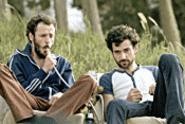The mere mention of a Palestinian movie triggers defensiveness on both sides of the debate over Palestinian statehood, as does the notion of a movie that might dare to portray suicide bombers as three-dimensional human beings. Paradise Now, while taking a definite antiviolence stance, further dares to be a black comedy. Oh, the last 10 minutes or so are deadly serious, and the marketing focuses on how it's a call for peace, but the movie also has the sheer brazenness to find humor in the suicide bomber's experience.
We're not quite talking Dr. Strangelove here, though there is a discussion of Jews putting chemicals in the water to weaken Palestinian sperm that recalls Stanley Kubrick's classic antiwar absurdism. Director Hany Abu-Assad (Rana's Wedding) is no Kubrick yet, but would Kubrick have had the cojones to make Strangelove at, say, the Berlin Wall? Abu-Assad's shoot took place mostly in the West Bank city of Nablus, where men with guns constantly admonished him to stop filming.
Saïd (Kais Nashif) and Khaled (Ali Suliman) seem like typical slacker mechanics when we first meet them, but in short order they are informed by their friend Jamal (Amer Hlehel) that they've been chosen for the next suicide mission against the Israelis. Neither wants to be involved without the other; agreeing to go for it together, they undergo all the necessary religious and practical training. But when the time comes for them to slip through the fence into Israeli territory, things don't go as planned and the two are separated, with Saïd getting lost. The terrorists are convinced he has betrayed them, but Khaled knows otherwise and pleads for a chance to find his friend so they can make things right. Meanwhile, Saïd's would-be girlfriend, Suha (Lubna Azabal), is starting to figure out what's going on.
One thing that's striking is the way that Saïd and Khaled's justifications for armed struggle and terrorism are almost exactly the same as American arguments for fighting against same. Negotiation didn't work; better to fight for freedom than live with oppression; even if we put down our weapons, the other side won't stop trying to kill us; political solutions won't work, because this is a war and the enemy thinks we have no right to exist. Argue all you like that the truth may not match the rhetoric; point is that the rhetoric seems to be universal.
None of the occasional humor cheapens the final blow, nor is the film designed to condone terrorism in any way. The chorus demanding more movies about our current war likely wasn't asking for this sort of thing, but you'll probably appreciate it nonetheless.










